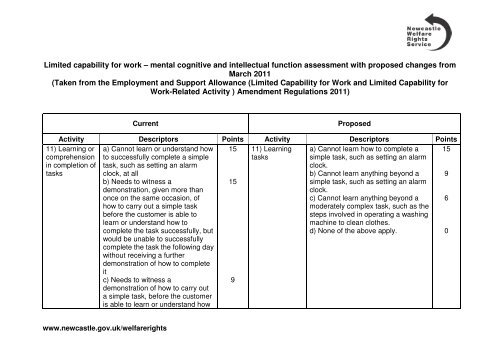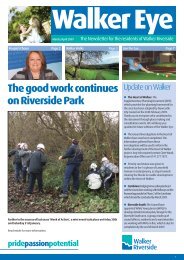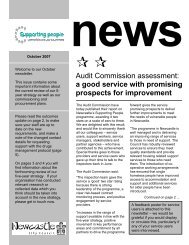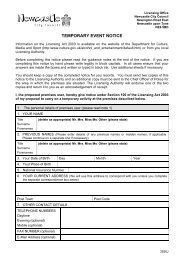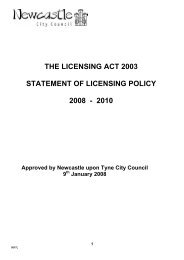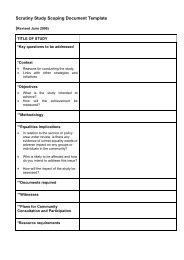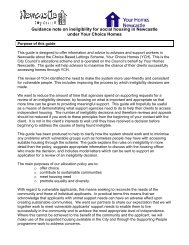Limited capability for work â mental cognitive and intellectual ...
Limited capability for work â mental cognitive and intellectual ...
Limited capability for work â mental cognitive and intellectual ...
You also want an ePaper? Increase the reach of your titles
YUMPU automatically turns print PDFs into web optimized ePapers that Google loves.
<strong>Limited</strong> <strong>capability</strong> <strong>for</strong> <strong>work</strong> – <strong>mental</strong> <strong>cognitive</strong> <strong>and</strong> <strong>intellectual</strong> function assessment with proposed changes fromMarch 2011(Taken from the Employment <strong>and</strong> Support Allowance (<strong>Limited</strong> Capability <strong>for</strong> Work <strong>and</strong> <strong>Limited</strong> Capability <strong>for</strong>Work-Related Activity ) Amendment Regulations 2011)CurrentProposedActivity Descriptors Points Activity Descriptors Points11) Learning orcomprehensionin completion oftasksa) Cannot learn or underst<strong>and</strong> howto successfully complete a simpletask, such as setting an alarmclock, at allb) Needs to witness ademonstration, given more thanonce on the same occasion, ofhow to carry out a simple taskbe<strong>for</strong>e the customer is able tolearn or underst<strong>and</strong> how tocomplete the task successfully, butwould be unable to successfullycomplete the task the following daywithout receiving a furtherdemonstration of how to completeitc) Needs to witness ademonstration of how to carry outa simple task, be<strong>for</strong>e the customeris able to learn or underst<strong>and</strong> how1515911) Learningtasksa) Cannot learn how to complete asimple task, such as setting an alarmclock.b) Cannot learn anything beyond asimple task, such as setting an alarmclock.c) Cannot learn anything beyond amoderately complex task, such as thesteps involved in operating a washingmachine to clean clothes.d) None of the above apply.15960www.newcastle.gov.uk/welfarerights
12) Awarenessof hazardsto complete the task successfully,but would be unable tosuccessfully complete the task thefollowing day without receiving averbal prompt from another persond) Needs to witness ademonstration of how to carry outa moderately complex task, suchas the steps involved in operatinga washing machine to correctlyclean clothes, be<strong>for</strong>e the customeris able to learn or underst<strong>and</strong> howto complete the task successfully,but would be unable tosuccessfully complete the task thefollowing day without receiving averbal prompt from another persone) Needs verbal instructions as tohow to carry out a simple taskbe<strong>for</strong>e the customer is able tolearn or underst<strong>and</strong> how tocomplete the task successfully, butwould be unable, within a period ofless than one week, tosuccessfully complete the task thefollowing day without receiving averbal prompt from another personf) None of the above applya) Reduced awareness of the risksof everyday hazards (such asboiling water or sharp objects)would lead to daily instances of or96015 12) Awarenessof everydayhazards (suchas boiling watera) Reduced awareness of everydayhazards leads to a significant risk of:(i) injury to self or others; or(ii) damage to property or15www.newcastle.gov.uk/welfarerights
to near-avoidance of:(i) injury to self or others; or(ii) significant damage toproperty or possessions,to such an extent that overall dayto day life cannot successfully bemanagedb) Reduced awareness of the risksof everyday hazards would lead<strong>for</strong> the majority of the time toinstances of or to near-avoidanceof:(i) injury to self <strong>and</strong> others; or(ii) significant damage toproperty or possessions,to such an extent that overall dayto day life cannot successfully bemanaged without supervision fromanother personc) Reduced awareness of the risksof everyday hazards has led orwould lead to frequent instances o<strong>for</strong> to near-avoidance of:(i) injury to self or others; or(ii) significant damage toproperty or possessions,but not to such an extent thatoverall day to day life cannot bemanaged when such incidentsoccurd) None of the above apply960or sharpobjects).possessions,Such that they require supervision <strong>for</strong>the majority of the time to maintainsafety.b) Reduced awareness of everydayhazards leads to a significant risk of:(i) injury to self or others; or(ii) damage to property orpossessions,Such that they frequently requiresupervision to maintain safety.c) Reduced awareness of everydayhazards leads to a significant risk of:(i) injury to self or others; or(ii) damage to property orpossessionsSuch that they occasionally requiresupervision to maintain safety.d) None of the above apply960www.newcastle.gov.uk/welfarerights
13) Memory<strong>and</strong>concentration14) Executionof tasksa) On a daily basis, <strong>for</strong>gets orloses concentration to such anextent that overall day to day lifecannot be successfully managedwithout receiving verbal prompting,given by someone else in thecustomer’s presenceb) For the majority of the time,<strong>for</strong>gets or loses concentration tosuch an extent that overall day today life cannot be successfullymanaged without receiving verbalprompting, given by someone elsein the customer’s presencec) Frequently <strong>for</strong>gets or losesconcentration to such an extentthat overall day to day life can onlybe successfully managed with preplanning,such as making a dailywritten list of all tasks <strong>for</strong>ming partof daily life that are to becompletedd) None of the above applya) Is unable to successfullycomplete any everyday taskb) Takes more than twice thelength of time it would take aperson without any <strong>for</strong>m of <strong>mental</strong>disablement, to successfullycomplete an everyday task withwhich the customer is familiarc) Takes more than one <strong>and</strong> a half159601515913) Initiating<strong>and</strong> completingpersonal action(which meansplanning,organisation,problemsolving,prioritising orswitchingtasks).14) Coping withchangea) Cannot, due to impaired <strong>mental</strong>function, reliably initiate or completeat least 2 sequential personal actions.b) Cannot, due to impaired <strong>mental</strong>function, reliably initiate or completeat least 2 personal actions <strong>for</strong> themajority of the time.c) Frequently cannot, due to impaired<strong>mental</strong> function, reliably initiate orcomplete at least 2 personal actions.d) None of the above apply.a) Cannot cope with any change tothe extent that day to day life cannotbe managed.b) Cannot cope with minor plannedchange (such as a pre-arrangedchange to the routine time scheduled<strong>for</strong> a lunch break), to the extent thatoverall, day to day life is madesignificantly more difficult.15960159www.newcastle.gov.uk/welfarerights
15) Initiating<strong>and</strong> sustainingpersonal actiontimes but no more than twice thelength of time it would take aperson without any <strong>for</strong>m of <strong>mental</strong>disablement to successfullycomplete an everyday task withwhich the customer is familiard) Takes one <strong>and</strong> a half times thelength of time it would take aperson without any <strong>for</strong>m of <strong>mental</strong>disablement to successfullycomplete an everyday task withwhich the customer is familiare) None of the above applya) Cannot, due to <strong>cognitive</strong>impairment or a severe disorder ofmood or behaviour, initiate orsustain any personal action (whichmeans planning, organisation,problem solving, prioritising orswitching tasks)b) Cannot, due to <strong>cognitive</strong>impairment or a severe disorder ofmood or behaviour, initiate orsustain personal action withoutrequiring verbal prompting givenby another person in thecustomer’s presence <strong>for</strong> themajority of the timec) Cannot, due to <strong>cognitive</strong>impairment or a severe disorder ofmood or behaviour, initiate orsustain personal action without601515915) Gettingaboutc) Cannot cope with minor unplannedchange (such as the timing of anappointment on the day it is due tooccur), to the extent that overall, dayto day life is made significantly moredifficult.d) None of the above apply.a) Cannot get to any specified placewith which the claimant is familiar.b) Is unable to get to a specifiedplace with which the claimant isfamiliar, without being accompaniedby another person.c) Is unable to get to a specifiedplace with which the claimant isunfamiliar without being accompaniedby another person.d) None of the above apply6015960www.newcastle.gov.uk/welfarerights
equiring verbal prompting givenby another person in thecustomer’s presence <strong>for</strong> themajority of the timed) Cannot, due to <strong>cognitive</strong>impairment or a severe disorder ofmood or behaviour, initiate orsustain personal action withoutrequiring frequent verbal promptinggiven by another person in thecustomer’s presencee) None of the above apply6016) Coping withchangea) Cannot cope with very minor,expected changes in routine, to theextent that overall day to day lifecannot be managedb) Cannot cope with expectedchanges in routine (such as apre-arranged permanent change tothe routine time scheduled <strong>for</strong> alunch break), to the extent thatoverall day to day life is madesignificantly more difficultc) Cannot cope with minor,un<strong>for</strong>eseen changes in routine(such as an unexpected change ofthe timing of an appointment onthe day it is due to occur), to theextent that overall, day to day lifeis made significantly more difficultd) None of the above apply1596016) Coping withsocialengagementdue to <strong>cognitive</strong>impairment or<strong>mental</strong> disordera) Engagement in social contact isalways precluded due to difficultyrelating to others or significantdistress experienced by theindividual.b) Engagement in social contact withsomeone unfamiliar to the claimant isalways precluded due to difficultyrelating to others or significantdistress experienced by theindividual.c) Engagement in social contact withsomeone unfamiliar to the claimant isprecluded <strong>for</strong> the majority of the timedue to difficulty relating to others orsignificant distress experienced bythe individual.d) None of the above apply.15960www.newcastle.gov.uk/welfarerights
17) Gettingabout18) Coping withsocial situationsa) Cannot get to any specifiedplace with which the customer is,or would be, familiarb) Is unable to get to a specifiedplace with which the customer isfamiliar, without beingaccompanied by another personon each occasionc) For the majority of the time isunable to get to a specified placewith which the customer is familiarwithout being accompanied byanother persond) Is frequently unable to get to aspecified place with which thecustomer is familiar without beingaccompanied by another persone) None of the above applya) Normal activities, <strong>for</strong> example,visiting new places or engaging insocial contact, are precludedbecause of overwhelming fear oranxietyb) Normal activities, <strong>for</strong> example,visiting new places or engaging insocial contact, are precluded <strong>for</strong>the majority of the time due tooverwhelming fear or anxietyc) Normal activities, <strong>for</strong> example,visiting new places or engaging insocial contact, are frequentlyprecluded, due to overwhelming1515960159617)Appropriateness of behaviourwith otherpeople, due to<strong>cognitive</strong>impairment or<strong>mental</strong> disordera) Has, on a daily basis,uncontrollable episodes of aggressiveor disinhibited behaviour that wouldbe unreasonable in any <strong>work</strong> place.b) Frequently has uncontrollableepisodes of aggressive or disinhibitedbehaviour that would beunreasonable in any <strong>work</strong>place.c) Occasionally has uncontrollableepisodes of aggressive or disinhibitedbehaviour that would beunreasonable in any <strong>work</strong>place.d) None of the above apply.Amalgamated into activity 16151590www.newcastle.gov.uk/welfarerights
19) Propriety ofbehaviour withother peoplefear or anxietyd) None of the above apply 0a) Has unpredictable outbursts ofaggressive, disinhibited, or bizarrebehaviour, being either:(i) sufficient to cause disruptionto others on a daily basis; or(ii) of such severity thatalthough occurring lessfrequently thanon a daily basis, no reasonableperson would be expected totolerate themb) Has a completelydisproportionate reaction to minorevents or to criticism to the extentthat the customer has an extremeviolent outburst leading tothreatening behaviour or actualphysical violencec) Has unpredictable outbursts ofaggressive, disinhibited or bizarrebehaviour, sufficient in severity<strong>and</strong> frequency to cause disruption<strong>for</strong> the majority of the timed) Has a strongly disproportionatereaction to minor events or tocriticism, to the extent that thecustomer cannot manage overallday to day life when such eventsor criticism occure) Has unpredictable outbursts of1515996Now activity 17www.newcastle.gov.uk/welfarerights
20) Dealingwith otherpeopleaggressive, disinhibited or bizarrebehaviour, sufficient to causefrequent disruptionf) Frequently demonstrates amoderately disproportionatereaction to minor events or tocriticism but not to such an extentthat the customer cannot manageoverall day to day life when suchevents or criticism occurg) None of the above applya) Is unaware of impact of ownbehaviour to the extent that:(i) has difficulty relating toothers even <strong>for</strong> briefperiods, such as a fewhours; or(ii) causes distress to otherson a daily basisb) The customer misinterpretsverbal or non-verbalcommunication to the extent ofcausing himself or herselfsignificant distress on a daily basisc) Is unaware of impact of ownbehaviour to the extent that:(i) has difficulty relating toothers <strong>for</strong> longer periods,such as a day or two; or(ii) causes distress to others<strong>for</strong> the majority of the timed) The customer misinterprets60151599Amalgamated into activity 16 <strong>and</strong> 17www.newcastle.gov.uk/welfarerights
verbal or non-verbalcommunication to the extent ofcausing himself or herselfsignificant distress to himself <strong>for</strong>the majority of the timee) Is unaware of impact of ownbehaviour to the extent that:(i) has difficulty relating toothers <strong>for</strong> prolongedperiods, such as a week; or(ii) frequently causesdistress to othersf) The customer misinterpretsverbal or non-verbalcommunication to the extent ofcausing himself or herselfsignificant distress on a frequentbasisg) None of the above apply660www.newcastle.gov.uk/welfarerights


